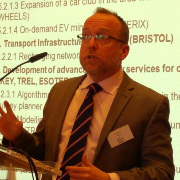
Credit: brazzo, iStock, Getty Images Plus via Getty Images
Climate change is amongst the most challenging existential threats facing us today. The action that’s needed to address and arrest the impacts is wide-ranging and profound. Here in the UK local authorities carry a significant proportion of the burden in delivering this.
Climate Emergency UK estimate that a third of all emissions are within the influence of local councils. Their statutory roles will need to be fundamentally disrupted to transition to carbon neutral activities. The roles are around:
- housing
- transport
- waste
- planning.
During a time of decreasing resources and increasing demand for services this transformation will require:
- bold choices
- ground-breaking technologies
- new delivery and business models.
As place leaders they must also represent the vulnerable in society, making sure that these changes don’t deepen existing inequalities.

Credit: Laurence Dutton, iStock, Getty Images Plus via Getty Images
Delivering on ambition
It’s clear that council’s recognise the urgency and significance of this situation, with 95% of authorities having some strategic target or policy reflecting their commitment to net zero. Innovative businesses have been working hard to provide the step changing technologies to deliver on this ambition, but much of it has yet to be deployed at any significant scale.
This has been explored in Innovate UK’s report ‘Getting to net zero: bridging the innovation gap between places and companies (PDF, 4.8MB)’.
This might appear to be an onerous challenge and bleak outlook, however Innovate UK sees an enormous opportunity for the UK to prosper from being the fastest transitioning economy to net zero. Benefits could be realised for the whole of the UK:
- environmentally
- economically
- socially.
With this in mind, we set out to explore the mechanisms to accelerate the uptake and scaling of net zero technologies amongst local authorities.
Critical barriers to net zero
Earlier work with local authorities had indicated that there are a range of critical barriers holding back a broad and rapid roll-out of innovative net zero technologies. The barriers include:
- a lack of alignment between the challenges prioritised by local authorities and the innovation sector’s understanding of those challenges and translation of these challenges into relevant, deployable products and services
- the fragmented nature of the local government net zero innovation marketplace
- the complexity, expense and risk associated with procuring net zero innovations at scale
- a lack of clearly articulated and understood business cases for investment in net zero solutions and associated infrastructure
- an underutilisation of dedicated options for procuring innovation.
Innovate UK looked to address some of these barriers to catalyse and grow the uptake of innovative net zero products and services. We explored the effect of regionally brokered place-based collaborations, creative, strategic procurement and increased understanding between public authorities and innovative small and medium enterprise (SME) businesses.
To achieve this Innovate UK worked with Innovate UK KTN and East of England Local Government Association (EELGA). EELGA provided a critical convening role, encouraging participation and brokering communications with the 50 local authorities within their patch.

Credit: Vasyl Dolmatov, iStock, Getty Images Plus via Getty Images
Identifying and developing the challenges
Innovate UK KTN ran workshops which identified eleven shared challenges across the region, subsequently creating eight working groups to develop the challenges.
Then they implemented their Innovation Exchange process to identify the optimal solutions in the market to extending the life of fleet vehicles via low or zero carbon technologies. This pilot exercise concluded with a networking and showcasing event in Cambridge, where authority delegates could share their priorities, and the delivery partners could share the learning for this pilot exercise.
Our explorations suggested that to successfully support regional collaborations around procuring innovative net zero solutions, the following would need to be in place:
- a project partner engaged with, and credible to, regional local authorities to ensure good levels of participation and trust
- an environment of genuine open dialogues between authorities, to ensure that valuable experiences along the journey, rather than just success stories, are shared
- connections and communication with other relevant regional and national stakeholders (including Catapults, Net Zero Hubs, Crown Commercial Services, central government bodies).
Evaluation report
A summary of our evaluation report has been produced which sets out, at a high level, our activities and findings. Innovate UK recognises the extraordinary help of East of England LGA and Innovate UK KTN Places Team, without whom this project would never have happened. We are also enormously grateful to the local authorities in the East of England who participated so enthusiastically.
We will be employing the lessons learned during this pilot in developing a new, net zero living, place-based innovation programme. We hope to launch this programme towards the end of 2022. Details will be published on the Innovation Funding Service.
Further information
Follow Innovate UK on Twitter
Connect with Innovate UK on LinkedIn
Follow Innovate UK on Facebook
You can go to the new Innovate UK website
You can go to the Innovate UK EDGE website
Subscribe to our YouTube channel
Sign up for our email newsletter
Top image: Credit: ollo, E+ via Getty Images




